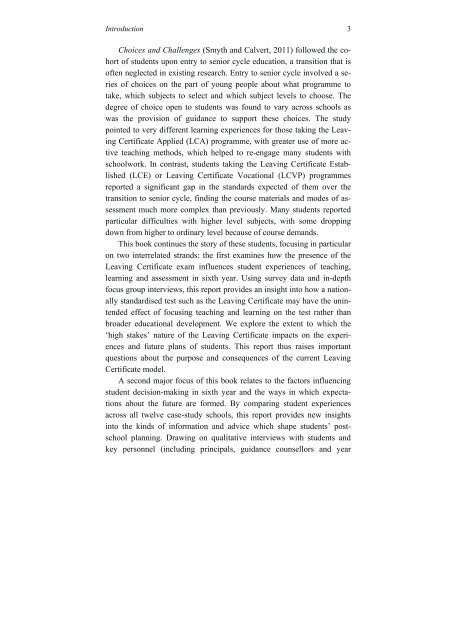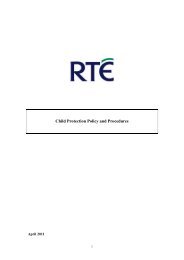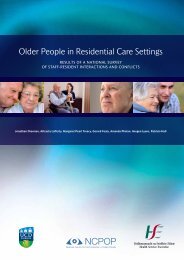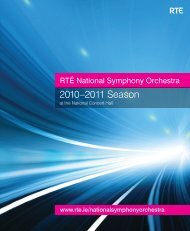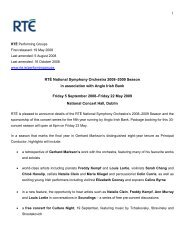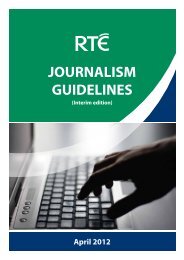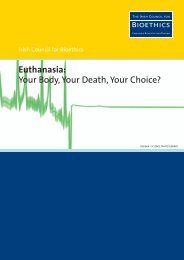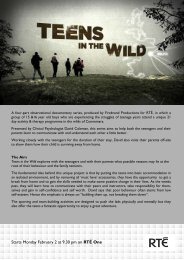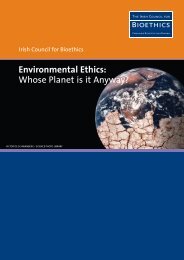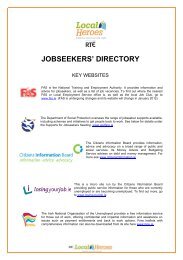From Leaving CertiFiCate to Leaving SChooL a Longitudinal Study ...
From Leaving CertiFiCate to Leaving SChooL a Longitudinal Study ...
From Leaving CertiFiCate to Leaving SChooL a Longitudinal Study ...
You also want an ePaper? Increase the reach of your titles
YUMPU automatically turns print PDFs into web optimized ePapers that Google loves.
Introduction 3<br />
Choices and Challenges (Smyth and Calvert, 2011) followed the cohort<br />
of students upon entry <strong>to</strong> senior cycle education, a transition that is<br />
often neglected in existing research. Entry <strong>to</strong> senior cycle involved a series<br />
of choices on the part of young people about what programme <strong>to</strong><br />
take, which subjects <strong>to</strong> select and which subject levels <strong>to</strong> choose. The<br />
degree of choice open <strong>to</strong> students was found <strong>to</strong> vary across schools as<br />
was the provision of guidance <strong>to</strong> support these choices. The study<br />
pointed <strong>to</strong> very different learning experiences for those taking the <strong>Leaving</strong><br />
Certificate Applied (LCA) programme, with greater use of more active<br />
teaching methods, which helped <strong>to</strong> re-engage many students with<br />
schoolwork. In contrast, students taking the <strong>Leaving</strong> Certificate Established<br />
(LCE) or <strong>Leaving</strong> Certificate Vocational (LCVP) programmes<br />
reported a significant gap in the standards expected of them over the<br />
transition <strong>to</strong> senior cycle, finding the course materials and modes of assessment<br />
much more complex than previously. Many students reported<br />
particular difficulties with higher level subjects, with some dropping<br />
down from higher <strong>to</strong> ordinary level because of course demands.<br />
This book continues the s<strong>to</strong>ry of these students, focusing in particular<br />
on two interrelated strands: the first examines how the presence of the<br />
<strong>Leaving</strong> Certificate exam influences student experiences of teaching,<br />
learning and assessment in sixth year. Using survey data and in-depth<br />
focus group interviews, this report provides an insight in<strong>to</strong> how a nationally<br />
standardised test such as the <strong>Leaving</strong> Certificate may have the unintended<br />
effect of focusing teaching and learning on the test rather than<br />
broader educational development. We explore the extent <strong>to</strong> which the<br />
‘high stakes’ nature of the <strong>Leaving</strong> Certificate impacts on the experiences<br />
and future plans of students. This report thus raises important<br />
questions about the purpose and consequences of the current <strong>Leaving</strong><br />
Certificate model.<br />
A second major focus of this book relates <strong>to</strong> the fac<strong>to</strong>rs influencing<br />
student decision-making in sixth year and the ways in which expectations<br />
about the future are formed. By comparing student experiences<br />
across all twelve case-study schools, this report provides new insights<br />
in<strong>to</strong> the kinds of information and advice which shape students’ postschool<br />
planning. Drawing on qualitative interviews with students and<br />
key personnel (including principals, guidance counsellors and year


